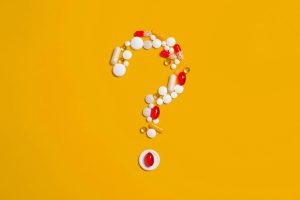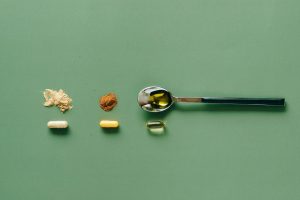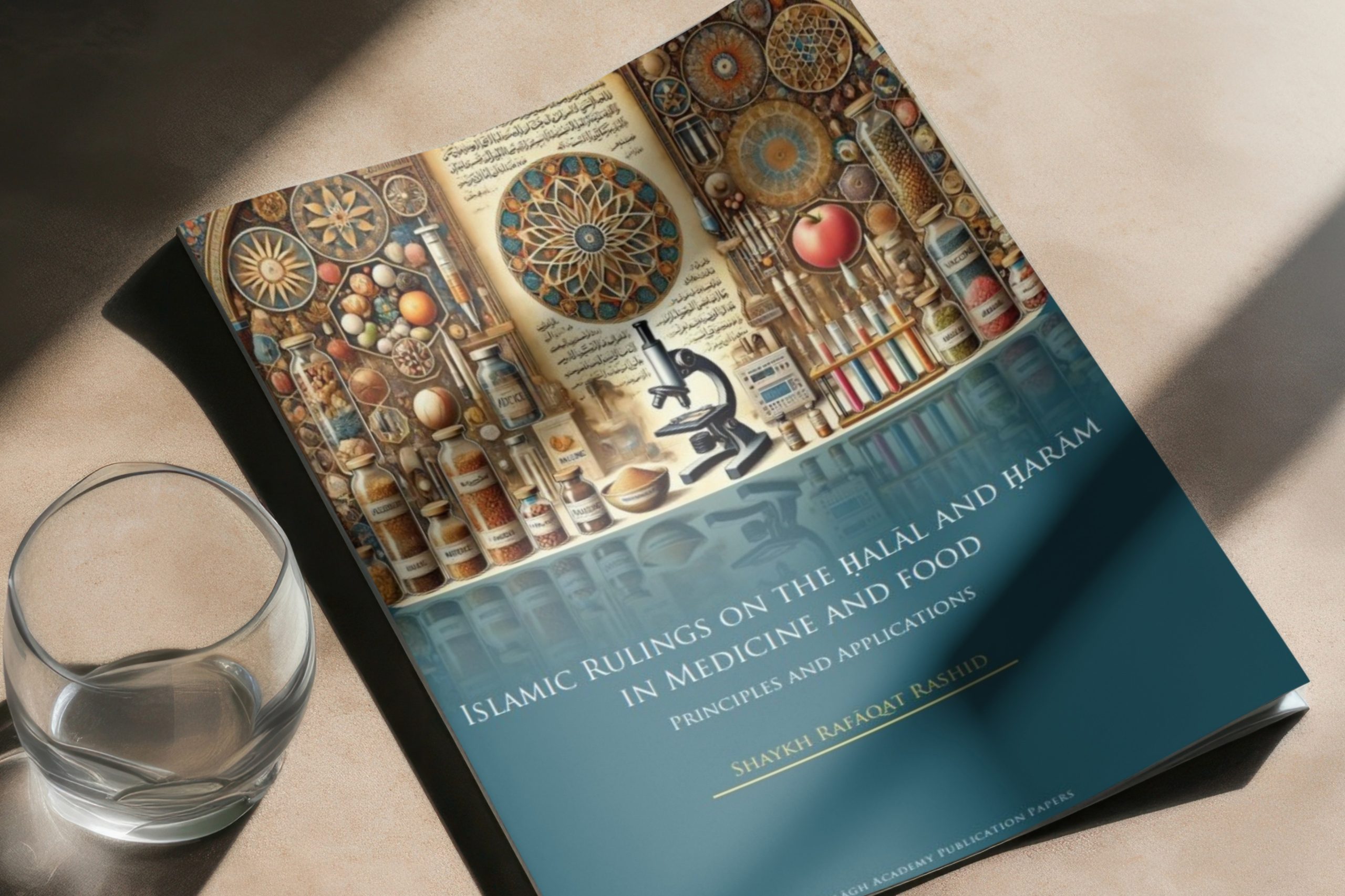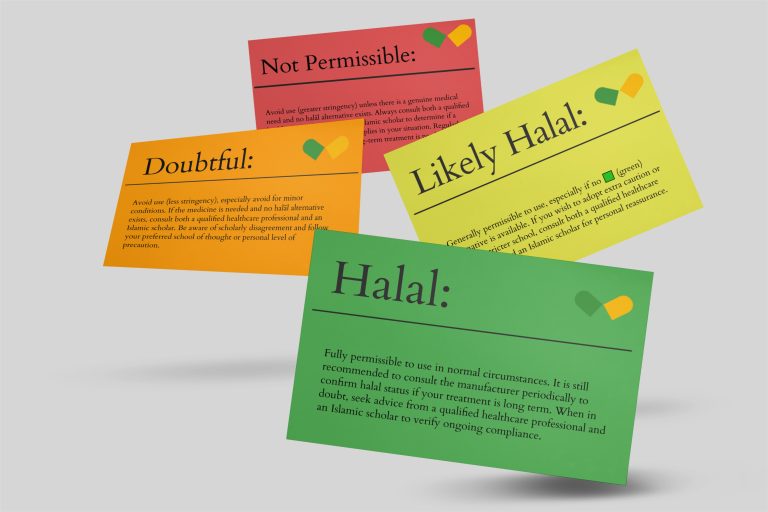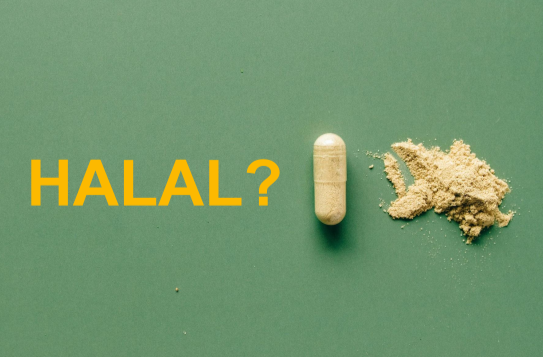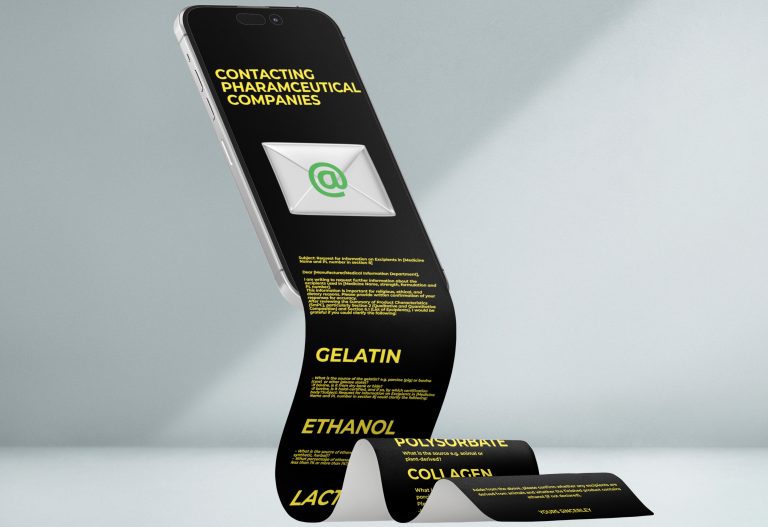Insulin in medicines
This resource explains the use of insulin in medicines and outlines the Islamic rulings on its permissibility.
What is insulin and how is it used in medicines?
- Insulin is a hormone made in the pancreas that helps to keep blood sugar at a healthy level by moving glucose (sugar) from the blood into the body’s cells for energy or storage.1
- Some health conditions make it necessary for a person to take insulin because their body is not making enough of it on its own.
- For example, people with type 1 diabetes do not make any insulin at all1, so they must take insulin to stay alive.
- In type 2 diabetes, about one in four people2 also produce less insulin than their body needs and may require insulin treatment.
There are three main types of insulin that are used in medicines:
🕌 Islamic ruling on insulin
| Type of insulin & source | Ruling: (Hanafi, Maliki, Shafiʿi and Hanbali) | Examples of insulin drug names (UK) |
|---|---|---|
| Recombinant human insulin source: synthetic | ✅ Halal | Insulin human (soluble), Insulin human (isophane / NPH), Insulin human (biphasic mixtures of soluble + isophane)5 |
| Human insulin analogues source: synthetic | ✅ Halal | insulin lispro, insulin aspart, insulin glulisine insulin glargine, insulin detemir, insulin degludec 6 |
| Porcine insulin source: porcine | ❌ Haram | Porcine Neutral insulin Porcine Isophane insulin Porcine 30/70 mixture (30% neutral, 70% isophane) 4 |
According to all four schools of thought (Hanafi, Maliki, Shafiʿi and Hanbali):
- Halal → Recombinant human insulin and human insulin analogues are synthetic, so are considered halal because they do not have any haram derivatives.
- Haram → Porcine (pig) insulin is considered haram due to pigs being considered impure (najis)3
Porcine insulin is no longer commonly used in comparison to recombinant human insulin and human insulin analogues, and its availability is being further reduced.4 There is a strong chance that the insulin you have been prescribed is not porcine derived. You can check the column ‘Examples of insulin drug names (UK)‘ in the table to help you identify what type of insulin you have been prescribed. For more guidance, see our FAQ section below.
If you are unsure about taking or using medicines containing ingredients and/or excipients from haram sources, seek guidance from a practising Muslim HCP such as a pharmacist or doctor. Alternatively, consult your local Imam or a trusted Islamic scholar, ideally one who has knowledge and expertise in the fiqh (Islamic rulings) of medicine.
💭Did you know?
Even if a medicine contains an ingredient/excipient from a haram source, it may still be permitted in certain cases. Here are three Islamic maxims (principles):
- Medical need or necessity (hajah and darurah): Under this principle, if there is a medical necessity, such as an emergency situation, or where there is a strong chance the individual’s health will deteriorate, and if no viable halal alternative is available, then it is permitted to take porcine derived insulin until a viable alternative (recombinant human insulin or human insulin analogues) becomes available.
- An impermissible medicine becomes permissible if five conditions are fully met (click here to learn what the five conditions are).
- Hardship begets facility (al-mashaqqa tajlib at-taysir): Under this principle, if applying religious practice becomes too burdensome or creates hardship, then leniency can be applied to ease it (Click here to read more). If you have tried your best to seek an alternative halal medicine and it becomes too difficult for you, this principle allows you to take/use the medicine you have been prescribed/supplied.
⚠️ Important information for patients
- Always take or use your medicine(s) exactly as directed or prescribed by your healthcare professional (HCP), such as your doctor or pharmacist
- Do not stop, delay, change or alter the way you take or use your medicine(s) without first discussing it with the HCP who prescribed or supplied it to you
- Always consult your HCP if you have any questions or before making any decisions about your treatment
- For Islamic guidance, seek advice from your local Imam or a trusted Islamic scholar – ideally someone with relevant knowledge and expertise in the fiqh (Islamic rulings) of medicines
- Use the information gathered to make an informed decision together with your HCP and, if needed, your local Imam or trusted Islamic scholar.
FAQs
Disclaimer
- This resource is for educational purposes only. It does not constitute clinical, medical, or professional healthcare advice and should not replace individual clinical judgement or qualified religious guidance
- Always consult your doctor, pharmacist, or other healthcare professional regarding your own medical conditions or for advice on treatment options
- Healthcare professionals remain fully responsible and accountable for decisions made within their own scope of practice.
References and resources
- Center for Disease Control and Prevention. About Insulin Resistance and Type 2 Diabetes. CDC, U.S. Department of Health & Human Services, May 15, 2024. Accessed August 17, 2025, from https://www.cdc.gov/diabetes/about/insulin-resistance-type-2-diabetes.html ↩︎
- Diabetes UK. Insulin and Type 2 Diabetes. Diabetes UK, content last reviewed 29 September 2022. Accessed 17 August 2025. Available at: https://www.diabetes.org.uk/about-diabetes/looking-after-diabetes/treatments/insulin/type-2-diabetes ↩︎
- Rashid, R. (n.d.). Islamic rulings on the ḥalāl and ḥarām in medicine and food: Principles and applications. Al Balāgh Academy Publication Papers ↩︎
- Community Pharmacy England. Medicine Supply Notification: Vial Presentations of Hypurin® Porcine Isophane, Hypurin® Porcine Neutral, and Hypurin® Porcine 30/70 Mix Are Being Discontinued. Community Pharmacy England, July 24, 2025. Accessed September 23, 2025, from https://cpe.org.uk/our-news/medicine-supply-notification-vial-presentations-of-hypurin-porcine-isophane-hypurin-porcine-neutral-and-hypurin-porcine-30-70-mix-are-being-discontinued/. ↩︎
References in table:
4. Community Pharmacy England. Medicine Supply Notification: Vial Presentations of Hypurin® Porcine Isophane,
Hypurin® Porcine Neutral, and Hypurin® Porcine 30/70 Mix Are Being Discontinued. Community Pharmacy England, July 24, 2025. Accessed September 23, 2025, from https://cpe.org.uk/our-news/medicine-supply-notification-vial-presentations-of-hypurin-porcine-isophane-hypurin-porcine-neutral-and-hypurin-porcine-30-70-mix-are-being-discontinued/.
5. British National Formulary. Insulin Preparations. BNF, NICE, September 2025. Accessed September 23, 2025, from https://bnf.nice.org.uk/treatment-summaries/insulin/?utm_source=chatgpt.com#insulin-preparations.
6. Independent Diabetes Trust. Availability of Natural Animal Insulins in the UK. Independent Diabetes Trust, September 2025.
Accessed September 23, 2025, from https://www.iddt.org/about/gm-vs-animal-insulin/availability-of-natural-animal-insulins-in-the-uk/


